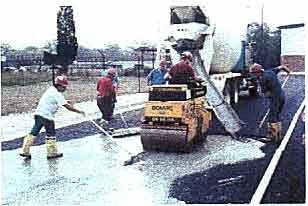 |
Fact Sheet |
| US Army Engineer Research and Development Center Waterways Experiment Station |
March 1999 |
3909 Halls Ferry Road · Vicksburg, MS 39180-6199 · (601) 634-2504
http://www.wes.army.mil
Resin Modified Pavement
Purpose: The resin modified pavement (RMP) is a new pavement surfacing alternative which provides many of the performance characteristics of a portland cement concrete pavement (PCC) with the economy and ease of construction of an asphalt concrete (AC) pavement.
 Background: Researchers at the US Army Engineer Waterways Experiment Station (WES) have been working for over ten years to develop a new pavement material technology known as the resin modified pavement. RMP is generally described as an open-graded asphalt concrete mixture with 25-35 percent air voids which are subsequently filled with a latex-rubber modified portland cement grout. The open-graded asphalt mixture and resin modified cement grout are produced and placed separately to provide a 40- to 65-mm-thick composite material. The resulting pavement surfacing is fuel-resistant, rut-resistant, requires little to no maintenance, and requires much less cost and effort to construct when compared to PCC.
Background: Researchers at the US Army Engineer Waterways Experiment Station (WES) have been working for over ten years to develop a new pavement material technology known as the resin modified pavement. RMP is generally described as an open-graded asphalt concrete mixture with 25-35 percent air voids which are subsequently filled with a latex-rubber modified portland cement grout. The open-graded asphalt mixture and resin modified cement grout are produced and placed separately to provide a 40- to 65-mm-thick composite material. The resulting pavement surfacing is fuel-resistant, rut-resistant, requires little to no maintenance, and requires much less cost and effort to construct when compared to PCC.
Facts: RMP may be used in new pavement construction or in the rehabilitation of existing pavement structures. A new RMP surfacing may be placed as an overlay over existing flexible or rigid pavements. RMP is typically used as a low-cost alternative to a PCC rigid pavement or as a means of improving the pavement performance over an AC surfaced flexible pavement. Field experience indicates that RMP may be used in practically any environmental conditions. RMP has been used in a variety of pavement applications including aircraft aprons and taxiways, parking lots, tank trails and motor pools, fuel and equipment storage yards, industrial and warehouse floorings, port facilities and bus depots. Pavement designs using RMP should cost 30-50 percent less than a comparable PCC design, and can reduce or eliminate maintenance costs because of their lack of joints to maintain and reseal. WES engineers have produced a great deal of technical documentation on the RMP technology including guide specifications, mix design and testing guides, structural design procedures, and general information on construction techniques.
Point of Contact: For more information, contact Dr. Gary Anderton at (601) 634-2955 or e-mail at andertg@ex1.wes.army.mil. For more information on WES and the Airfields and Pavements Division, visit the web sites at http://www.wes.army.mil and http://www.pavement.wes.army.mil.